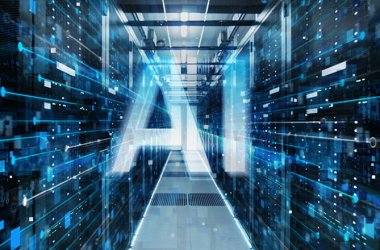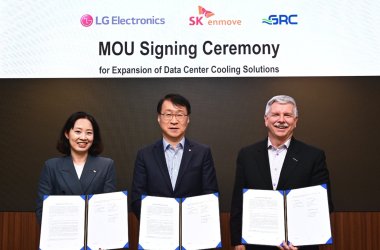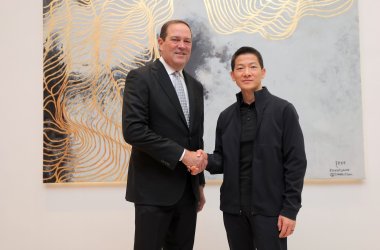CNME Editor Mark Forker sat down with Pierpaolo Taliento, CEO of MiCloud Software, to learn more about how the company’s technologies are reimagining workflows, the principles that are guiding their approach to building digital workspaces of the future, the challenges that remain in our work from anywhere world – and how MiCloud are leveraging the power of AI and infusing it into their product portfolio.

How does MiCloud Software envision the future of work, and what role do you see your company playing in that transformation?
As the exclusive representative of Cloud Software Group (CSG) in EEMEA, our role goes beyond delivering technology — we act as architects of secure, intelligent, human-centric workspaces for a region as diverse as Eastern Europe, the Middle East, and Africa.
We see the future of work not as a place, nor a set of tools, but as a living ecosystem that flexes around people, business needs, and the intelligence surrounding them.
We are moving away from the outdated concept of “workspace as a product.” In our vision, workspaces are borderless, adapting naturally to people’s lives. AI becomes a silent co-pilot that enhances human judgment and anticipates needs. Security transforms from a constraint into a catalyst for freedom and trust.
We’re not here to digitize old workflows – we are here to engineer environments where work flows with life. That’s the future — and that’s MiCloud’s mission in EEMEA.
What leadership principles guide MiCloud’s approach to building digital workspaces that are adaptive, resilient, and human-centric?
First, we embrace systems thinking over rigid control. In a connected world, leadership means creating conditions where autonomy thrives and people can operate at their best — without micromanagement or artificial barriers.
Second, we design for the invisible. The most powerful technologies are those you don’t notice because they fit so seamlessly into your workflow that they simply disappear. We aim to make our solutions as intuitive and frictionless as possible.
Third, we measure success by human impact, not just business metrics. A resilient workspace isn’t just technically robust — it’s emotionally sustainable. It fosters connection, supports creativity, and gives people a sense of purpose and belonging.
How has your strategy shifted post-pandemic to support remote, hybrid, and globally distributed teams more effectively?
The pandemic didn’t just redefine where people work — it redefined how trust, collaboration, and value are created.
Before 2020, digital tools were about process efficiency. Today, our strategy focuses on building connected ecosystems that make distributed work feel natural, fluid, and deeply human.
We deliver Citrix and TIBCO software solutions that enable secure, high-performance digital workspaces and seamless data integration. We don’t just sell licenses — we empower our partner ecosystem to deliver services, customization, and local support, ensuring our customers can scale, adapt, and succeed across diverse markets.
Our shift has been from providing software platforms to enabling environments where people, AI, and systems collaborate in real time — with Citrix powering secure, flexible access and TIBCO driving intelligent data integration and insights.
This isn’t just a shift from office to remote. It’s a shift from control to connection — with Citrix and TIBCO at the heart, and our partners amplifying the value on the ground.
What are the biggest challenges companies face when adopting flexible work policies, and how can technology help overcome them?
The real challenge with flexible work isn’t technology — it’s human nature.
Companies fear losing control, employees fear losing connection, and leaders fear losing visibility. The result is often a patchwork of policies, tools, and compromises that please no one and frustrate everyone.
In EEMEA, where cultures, infrastructures, and regulations vary widely, this tension is even sharper. Flexibility without clarity breeds confusion. Freedom without trust breeds chaos.
That’s where technology becomes more than a tool — it becomes the backbone of a new social contract between employers and employees.
With Citrix, we provide digital workspaces that guarantee secure, seamless access, no matter where or how people work. With TIBCO, we help organizations integrate and visualize data across distributed environments, so decisions stay informed and connected.
But most importantly, we believe technology should guide flow — not enforce control. The future of flexible work depends on systems that empower autonomy, foster transparency, and make trust the default setting.
How is MiCloud Software integrating AI into its products or services to enhance productivity and employee experience?
We don’t believe in AI for the sake of AI. We believe in AI that makes work more human.
Through Citrix, AI helps create adaptive workspaces — predicting user needs, streamlining access, and reducing digital noise. It’s the silent assistant that removes friction: fewer logins, smarter resource allocation, and a personalized experience that feels natural, not intrusive.
With TIBCO, AI transforms data into decisions. It empowers organizations to visualize complex data, detect patterns, and automate insights — helping leaders make smarter choices in real time.
But for us, AI isn’t a product feature. It’s a philosophy. We see it as a co-pilot that relieves people from the dull, the repetitive, and the overwhelming — so they can focus on creativity, connection, and leadership.
What are your thoughts on the ethical use of AI in workplace settings, especially concerning employee monitoring and decision-making?
We believe AI in the workplace should follow one golden rule: If it wouldn’t be acceptable in a human relationship, it shouldn’t be acceptable in a digital one.
AI should never be used as a surveillance tool. Monitoring behavior to control people erodes trust, stifles creativity, and breaks the very human connection that flexible work relies on.
Instead, AI should act as a guide — highlighting patterns, offering insights, and supporting better decisions. With Citrix, this means enabling proactive security and seamless user experiences without ever crossing into invasive oversight. With TIBCO, it means empowering data-driven leadership that’s transparent, explainable, and always accountable.
We see AI as a mirror, not a magnifying glass. It should reflect opportunities, not expose weaknesses.
Our commitment is simple: We build technology that protects human dignity first — and serves business goals second. That’s not just ethics. That’s long-term business sense.





